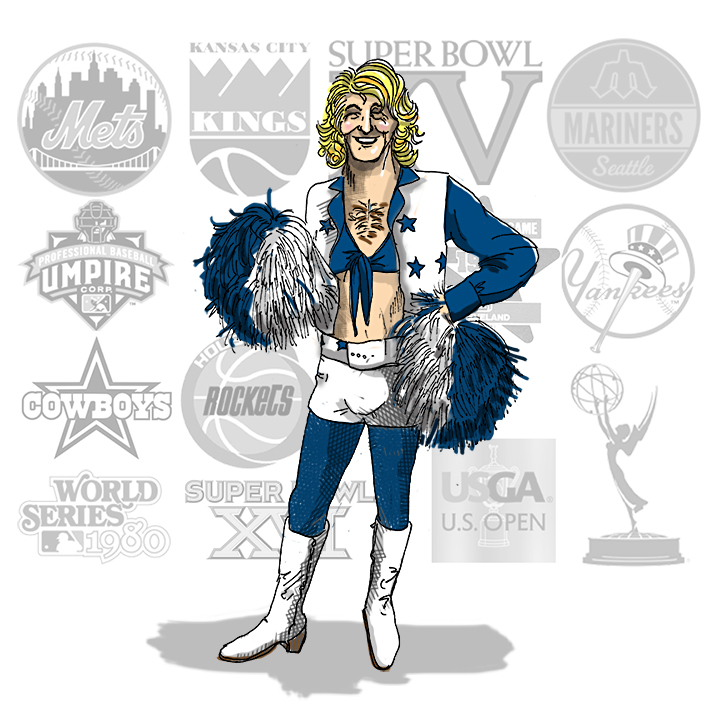
Barry Bremen was an insurance salesman, a happy husband and father of three from West Bloomfield, Michigan, a suburb of Detroit. In high school and after, he regularly played football, softball and basketball with guys from work and the neighborhood. He loved sports, but playing them on an amateur level wasn’t enough. He wanted more.
On February 4, 1979, 32-year-old Barry put on a Kansas City Kings jersey (the team has since moved to Sacramento) and made his way — unnoticed — onto the playing floor of the NBA All-Star Game, held in the Pontiac Silverdome. While mingling with the players during pre-game warm-ups, Barry was given the “once-over” by King’s point guard Otis Birdsong, who narrowed his eyes and said, “You’re on my team, and I don’t even know who you is.” Barry was escorted off the court by security.
Six months later, Barry donned a New York Yankees uniform and shagged flies in the outfield of the Seattle Kingdome for a full thirty minutes before the Baseball All-Star Game. It was only when he attempted to include himself in a pre-game team photo that he was spotted and ushered off the field. However, he didn’t leave the stadium. Instead, he sneaked into the home team clubhouse, hiding the the whirlpool bath. A Mariners trainer called security to have Barry removed… again.
Next, Barry showed up at the U.S. Open and played an unquestioned practice round with pro golfers Wayne Levi and Jerry Pate. He followed up with a course appearance at the 1980 U.S. Open where he played so poorly in a practice round that a spectator was overheard wondering how he made it to the qualifying round.
In December 1979, Barry, decked out in a full replica Dallas Cowgirls cheerleader costume, complete with blond wig, joined the real cheerleading squad on the field before a Cowboys-redskins game at Texas Stadium. Barry had practiced routines in preparation for this stunt, but only managed a single “Go Cowboys!” before he was handcuffed by authorities and led off the sidelines. The Cowboys organization sued Barry for $5000 and threatened to ban him from Cowboys games for life.
The 1980 World Series found Barry back on a baseball diamond, this time in an MLB umpire uniform. The other actual umpires noticed one extra man when the gathered at home plate. This incident ended in a similar fashion as the previous ones.
Barry appeared at the 1981 NBA All-Star Game in a Houston Rockets jersey and, later in the season, at Boston Gardens, posing as a game official. The same year, saw Barry dressed as a line judge at Super Bowl XV in Louisiana’s Superdome.
Barry attempted to enter the Silverdome once again in 1982, this time dressed as renowned mascot The San Diego Chicken. He made it past security but was arrested soon after.
Not content with conquering the sports world, Barry dressed in a tuxedo and managed to gain access to the 1985 Emmy Awards. He brazenly took the stage to accept the award for Betty Thomas, who had been announced as “Best Supporting Actress” for her work on the police drama Hill Street Blues. Thomas, who was in attendance at the event, was confused and angered when she approached the podium to find Barry Bremen holding her award. He relinquished the statuette, apologized to Thomas and was arrested. He was released after paying a fine of $175. Later in 1985, Barry took to the U.S. Open again, playing a practice round with a group of professional golfers. This time, Barry went completely unnoticed.
At the Houston Astrodome for the 1986 All-Star Game, Barry was once again chasing batting practice fly balls in the outfield, this time dressed in a New York Mets uniform. he was recognized by Dodgers manager Tommy Lasdora, who blew the proverbial whistle. Barry later revealed that he was treated so poorly in jail after his latest stunt that it would be his last.
And it was.
In 1993, tennis pro Monica Seles was attacked and stabbed by a deranged “fan” of contemporary Steffi Graf during a match in Hamburg, Germany. From that point forward, security was tightened at all sporting events worldwide. Taser wielding stadium guards and the suspicious feelings towards “unidentified” people in the post-9/11 days made the decision regarding an “anticipated comeback” an easy one for Barry. He felt the risks were too great and the fun had left his “exploits.”
A short-form documentary about Barry’s “infamy” premiered on ESPN in 2005 as part of the network’s 30-for-30 shorts series. Barry stayed far from the spotlight and passed away from esophageal cancer on his 64th birthday in 2011.
